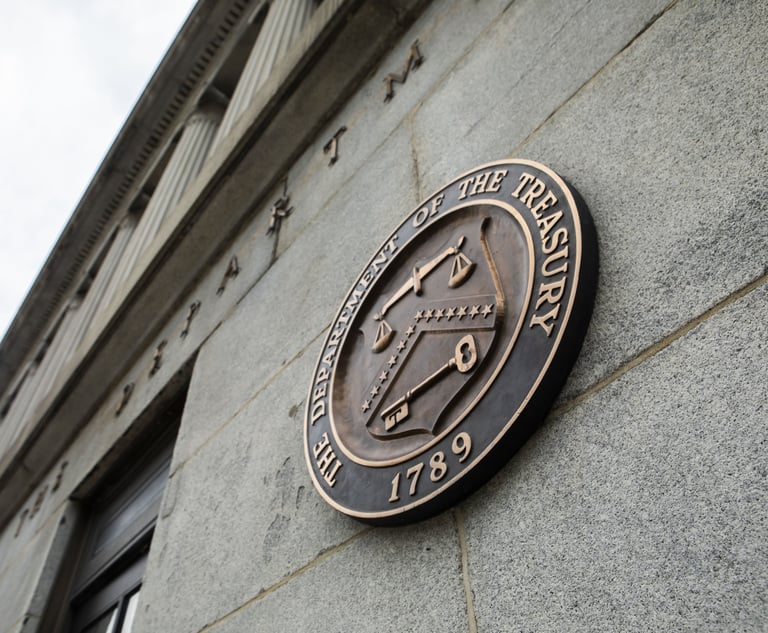Supreme Court Sides With Plaintiffs on Malpractice Records
Warning of attempts to “whittle away” at a 2004 constitutional amendment, the Florida Supreme Court has rejected arguments by hospitals that they…
October 31, 2017 at 03:55 PM
8 minute read

Warning of attempts to “whittle away” at a 2004 constitutional amendment, the Florida Supreme Court has rejected arguments by hospitals that they should be shielded from turning over records to plaintiffs in medical-malpractice cases.
The latest Supreme Court ruling came last week in a Polk County case and followed a January ruling in a Duval County case.
While the details of the cases were different, both focused on a 2004 constitutional amendment, commonly known as Amendment 7, that was backed by plaintiff attorneys and designed to expand access to medical records in malpractice lawsuits.
Records held by hospitals and other medical providers can play a key role in malpractice cases. The 2004 constitutional amendment was intended to provide access to what are known as “adverse medical incident” reports.
In the Polk County case, the Supreme Court overturned a decision by the Second District Court of Appeal that said Bartow Regional Medical Center did not have to turn over records that were produced during an external peer-review process by an outside company. Justice R. Fred Lewis, in a 32-page majority opinion Thursday, wrote that such reviews can't be excluded from the requirements of the constitutional amendment.
“Such a result would be directly contrary to the intent and express words of Florida voters to have greater access to adverse medical incident records than they did before the passage of Amendment 7,” Lewis wrote in an opinion fully joined by Chief Justice Jorge Labarga and Justices Barbara Pariente and Peggy Quince. “Moreover, the result asserted by Bartow would provide a trap door through which hospitals could totally avoid their discovery obligations by outsourcing their adverse medical incident reporting to external, voluntary risk management committees separate from those required by the Florida statutory scheme.”
Justice Ricky Polston agreed with the outcome, though he did not sign on to the majority opinion. Justice Alan Lawson, in a dissent joined by Charles Canady, said the Polk County hospital should not have to turn over the external reports because they were prepared in anticipation of litigation.
“Applying Amendment 7's plain language consistently with this [Supreme] Court's holding regarding its intent, like the Second District, I would conclude that the expert reports at issue — prepared at the request of the hospital's counsel, outside of the ordinary peer review process, in anticipation of imminent litigation — are not 'records made or received in the course of business' subject to disclosure pursuant to Amendment 7,” Lawson wrote.
Medical malpractice has long been a highly contentious legal and political issue in Florida. In 2004, that resulted in a ballot war between plaintiff attorneys and medical groups, with voters approving three constitutional amendments. Those amendments required the disclosure of adverse medical-incident reports; prevented physicians from being licensed if they have committed three incidents of medical malpractice; and sought to cap plaintiffs' attorney fees.
Litigation about the medical-records amendment has spent years moving through the legal system.
Last week's Supreme Court decision came in a lawsuit filed by Amber Edwards, who went to Bartow Regional Medical Center in 2011 with stomach pains and was diagnosed with gallstones. During a procedure, her common bile duct was cut, later requiring her to be transferred to Tampa General Hospital for emergency corrective surgery, according to the Supreme Court majority opinion.
Edwards sued the hospital and a physician, touching off the yearslong battle about providing medical records.
Meanwhile, in the January ruling in the Duval County case, the Supreme Court rejected arguments that a federal patient-safety law shielded the Baptist Health System from turning over some documents in a malpractice lawsuit. The U.S. Supreme Court early this month declined to take up an appeal by the hospital system.
Jim Saunders reports for the News Service of Florida.

Warning of attempts to “whittle away” at a 2004 constitutional amendment, the Florida Supreme Court has rejected arguments by hospitals that they should be shielded from turning over records to plaintiffs in medical-malpractice cases.
The latest Supreme Court ruling came last week in a Polk County case and followed a January ruling in a Duval County case.
While the details of the cases were different, both focused on a 2004 constitutional amendment, commonly known as Amendment 7, that was backed by plaintiff attorneys and designed to expand access to medical records in malpractice lawsuits.
Records held by hospitals and other medical providers can play a key role in malpractice cases. The 2004 constitutional amendment was intended to provide access to what are known as “adverse medical incident” reports.
In the Polk County case, the Supreme Court overturned a decision by the Second District Court of Appeal that said Bartow Regional Medical Center did not have to turn over records that were produced during an external peer-review process by an outside company. Justice R. Fred
“Such a result would be directly contrary to the intent and express words of Florida voters to have greater access to adverse medical incident records than they did before the passage of Amendment 7,”
Justice
“Applying Amendment 7's plain language consistently with this [Supreme] Court's holding regarding its intent, like the Second District, I would conclude that the expert reports at issue — prepared at the request of the hospital's counsel, outside of the ordinary peer review process, in anticipation of imminent litigation — are not 'records made or received in the course of business' subject to disclosure pursuant to Amendment 7,” Lawson wrote.
Medical malpractice has long been a highly contentious legal and political issue in Florida. In 2004, that resulted in a ballot war between plaintiff attorneys and medical groups, with voters approving three constitutional amendments. Those amendments required the disclosure of adverse medical-incident reports; prevented physicians from being licensed if they have committed three incidents of medical malpractice; and sought to cap plaintiffs' attorney fees.
Litigation about the medical-records amendment has spent years moving through the legal system.
Last week's Supreme Court decision came in a lawsuit filed by Amber Edwards, who went to Bartow Regional Medical Center in 2011 with stomach pains and was diagnosed with gallstones. During a procedure, her common bile duct was cut, later requiring her to be transferred to Tampa General Hospital for emergency corrective surgery, according to the Supreme Court majority opinion.
Edwards sued the hospital and a physician, touching off the yearslong battle about providing medical records.
Meanwhile, in the January ruling in the Duval County case, the Supreme Court rejected arguments that a federal patient-safety law shielded the Baptist Health System from turning over some documents in a malpractice lawsuit. The U.S. Supreme Court early this month declined to take up an appeal by the hospital system.
Jim Saunders reports for the News Service of Florida.
This content has been archived. It is available through our partners, LexisNexis® and Bloomberg Law.
To view this content, please continue to their sites.
Not a Lexis Subscriber?
Subscribe Now
Not a Bloomberg Law Subscriber?
Subscribe Now
NOT FOR REPRINT
© 2025 ALM Global, LLC, All Rights Reserved. Request academic re-use from www.copyright.com. All other uses, submit a request to [email protected]. For more information visit Asset & Logo Licensing.
You Might Like
View All
Shifting Battlegrounds in Administrative Law, From Biden to Trump II

Corporate Disclosure Law Enjoys ‘Presumption of Constitutionality,’ Feds Tell Justices

GC of Florida State Agency Steps Down After Threatening TV Stations That Aired Abortion-Rights Ad

11th Circuit Rejects Private School's Religious Rights Claim When Stopped From Broadcasting Public Prayer
Trending Stories
- 1South Florida Attorney Charged With Aggravated Battery After Incident in Prime Rib Line
- 2'A Death Sentence for TikTok'?: Litigators and Experts Weigh Impact of Potential Ban on Creators and Data Privacy
- 3Bribery Case Against Former Lt. Gov. Brian Benjamin Is Dropped
- 4‘Extremely Disturbing’: AI Firms Face Class Action by ‘Taskers’ Exposed to Traumatic Content
- 5State Appeals Court Revives BraunHagey Lawsuit Alleging $4.2M Unlawful Wire to China
Who Got The Work
J. Brugh Lower of Gibbons has entered an appearance for industrial equipment supplier Devco Corporation in a pending trademark infringement lawsuit. The suit, accusing the defendant of selling knock-off Graco products, was filed Dec. 18 in New Jersey District Court by Rivkin Radler on behalf of Graco Inc. and Graco Minnesota. The case, assigned to U.S. District Judge Zahid N. Quraishi, is 3:24-cv-11294, Graco Inc. et al v. Devco Corporation.
Who Got The Work
Rebecca Maller-Stein and Kent A. Yalowitz of Arnold & Porter Kaye Scholer have entered their appearances for Hanaco Venture Capital and its executives, Lior Prosor and David Frankel, in a pending securities lawsuit. The action, filed on Dec. 24 in New York Southern District Court by Zell, Aron & Co. on behalf of Goldeneye Advisors, accuses the defendants of negligently and fraudulently managing the plaintiff's $1 million investment. The case, assigned to U.S. District Judge Vernon S. Broderick, is 1:24-cv-09918, Goldeneye Advisors, LLC v. Hanaco Venture Capital, Ltd. et al.
Who Got The Work
Attorneys from A&O Shearman has stepped in as defense counsel for Toronto-Dominion Bank and other defendants in a pending securities class action. The suit, filed Dec. 11 in New York Southern District Court by Bleichmar Fonti & Auld, accuses the defendants of concealing the bank's 'pervasive' deficiencies in regards to its compliance with the Bank Secrecy Act and the quality of its anti-money laundering controls. The case, assigned to U.S. District Judge Arun Subramanian, is 1:24-cv-09445, Gonzalez v. The Toronto-Dominion Bank et al.
Who Got The Work
Crown Castle International, a Pennsylvania company providing shared communications infrastructure, has turned to Luke D. Wolf of Gordon Rees Scully Mansukhani to fend off a pending breach-of-contract lawsuit. The court action, filed Nov. 25 in Michigan Eastern District Court by Hooper Hathaway PC on behalf of The Town Residences LLC, accuses Crown Castle of failing to transfer approximately $30,000 in utility payments from T-Mobile in breach of a roof-top lease and assignment agreement. The case, assigned to U.S. District Judge Susan K. Declercq, is 2:24-cv-13131, The Town Residences LLC v. T-Mobile US, Inc. et al.
Who Got The Work
Wilfred P. Coronato and Daniel M. Schwartz of McCarter & English have stepped in as defense counsel to Electrolux Home Products Inc. in a pending product liability lawsuit. The court action, filed Nov. 26 in New York Eastern District Court by Poulos Lopiccolo PC and Nagel Rice LLP on behalf of David Stern, alleges that the defendant's refrigerators’ drawers and shelving repeatedly break and fall apart within months after purchase. The case, assigned to U.S. District Judge Joan M. Azrack, is 2:24-cv-08204, Stern v. Electrolux Home Products, Inc.
Featured Firms
Law Offices of Gary Martin Hays & Associates, P.C.
(470) 294-1674
Law Offices of Mark E. Salomone
(857) 444-6468
Smith & Hassler
(713) 739-1250






